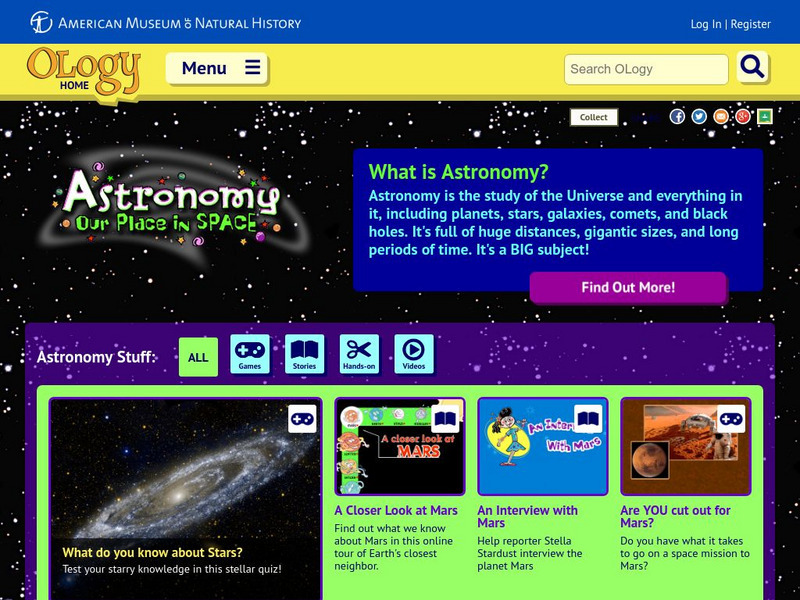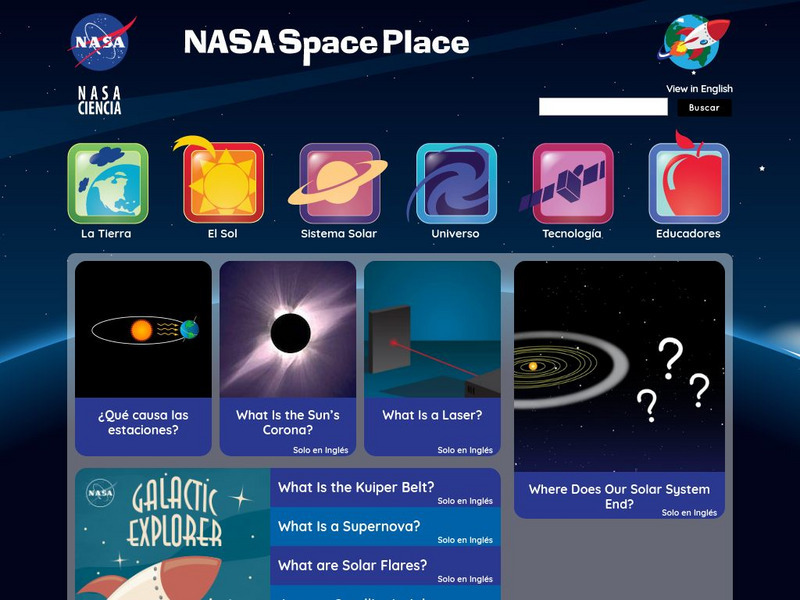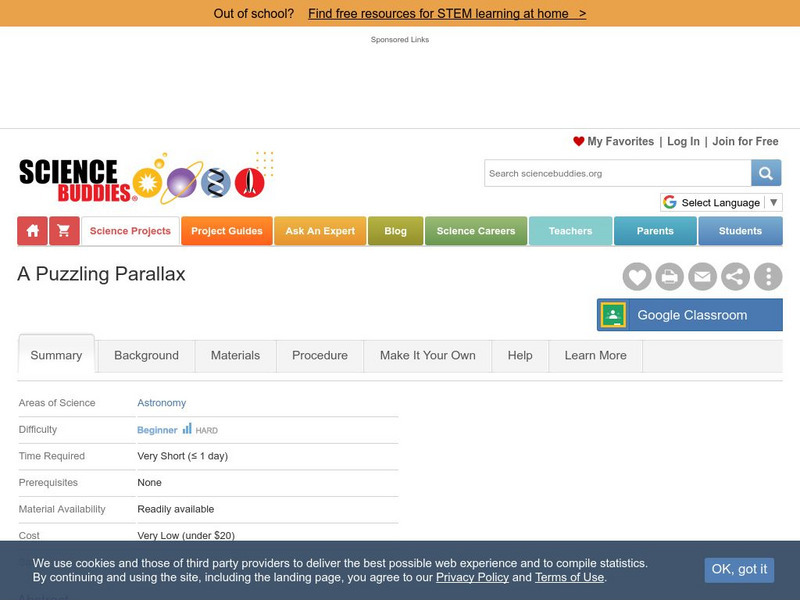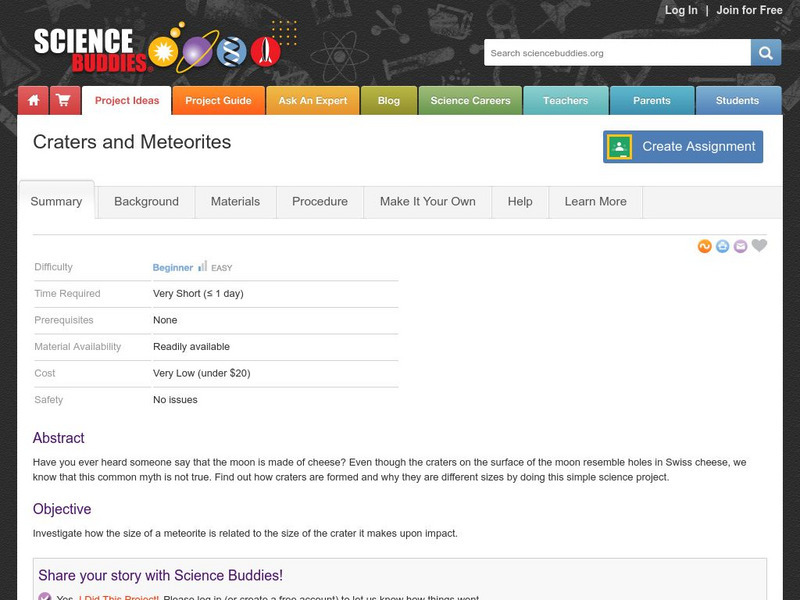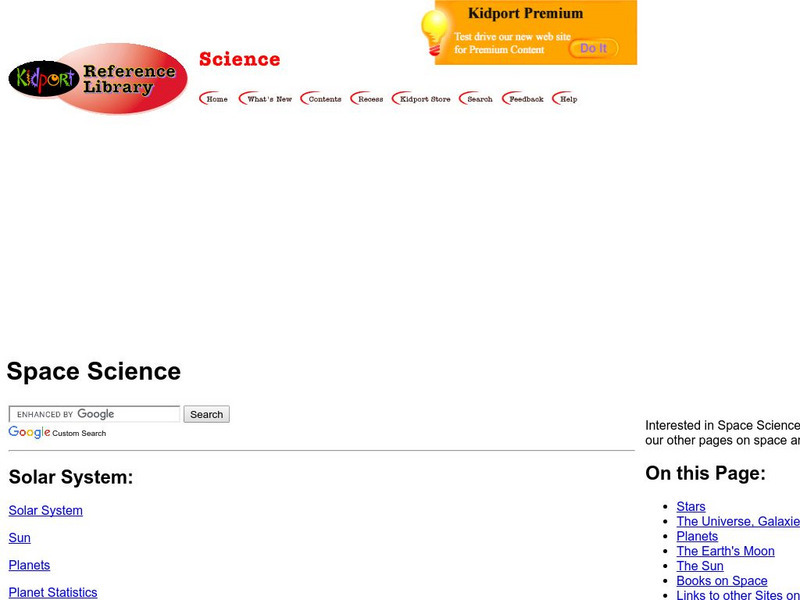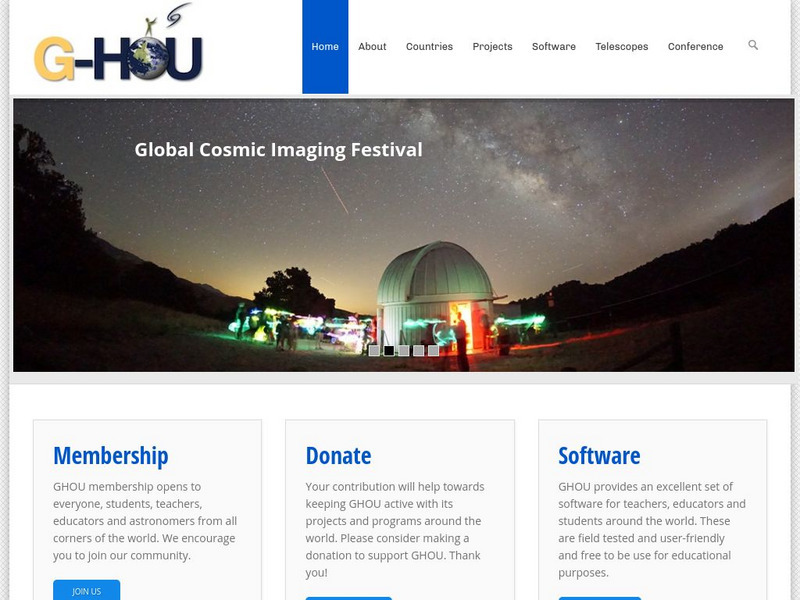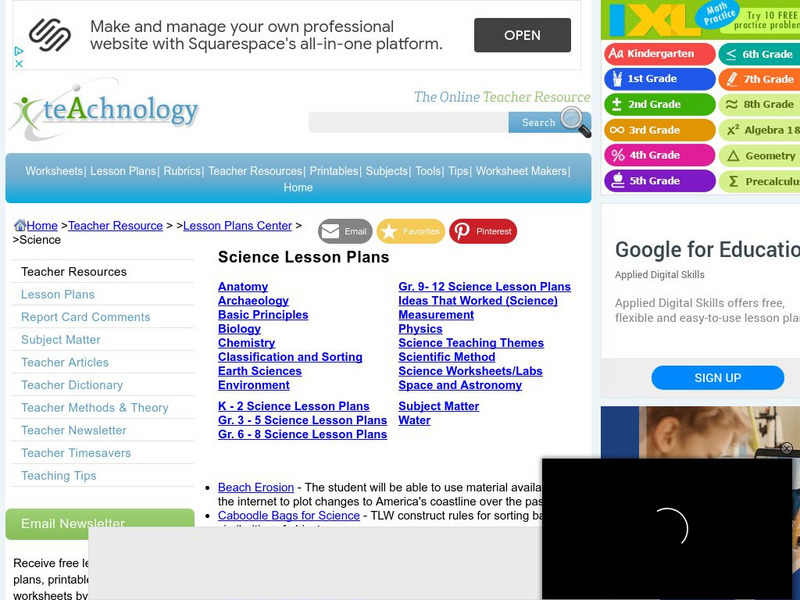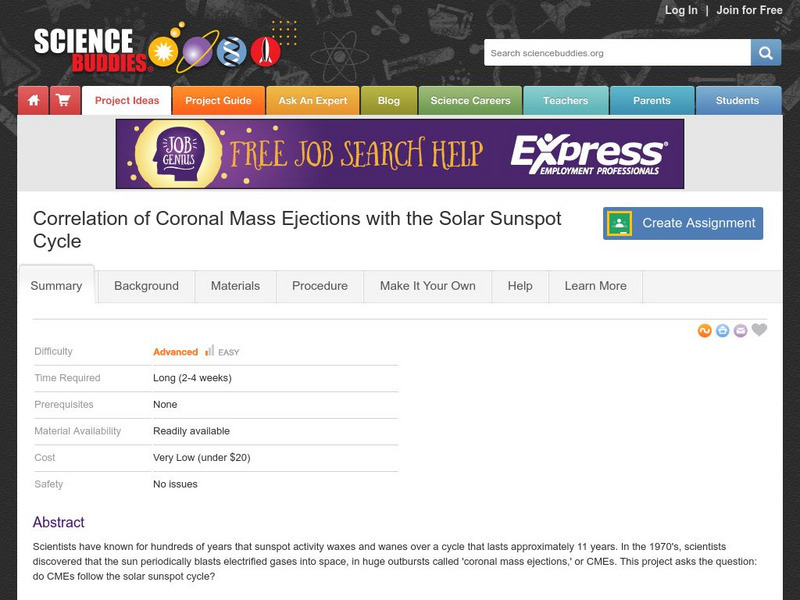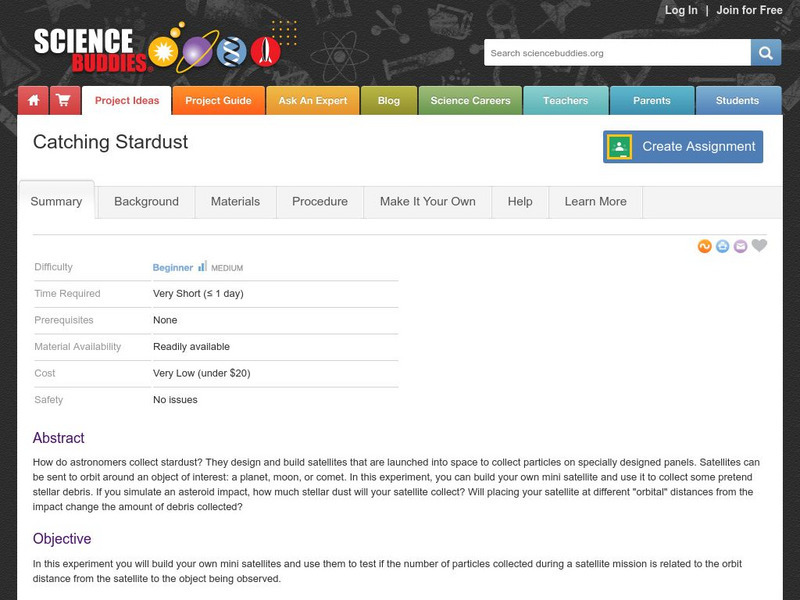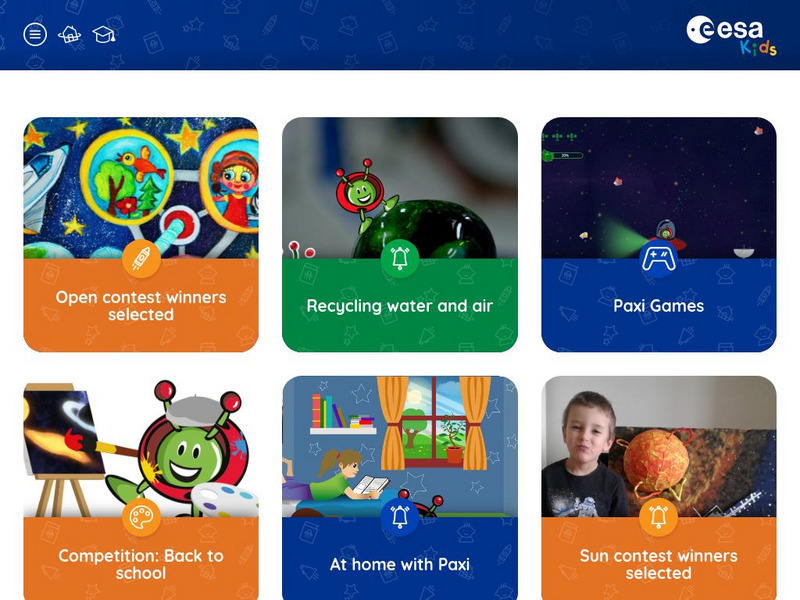Hi, what do you want to do?
American Museum of Natural History
American Museum of Natural History: O Logy: Astronomy: Our Place in Space
This resource is a place for learning all about astronomy--stargazing, planets, space science, and interesting astronomical phenomena and discoveries. Explore, ask questions, find information, and meet American Museum of Natural History...
National Science Foundation
National Science Foundation: Astronomy and Space: Research Overview
Explore some of our most fundamental questions about space exploration with this research overview collected by scientists at the National Science Foundation. Additionally, experience deep space first-hand with telescope interactives.
NASA
Nasa Space Place: El Space Place
NASA's space science site for kids - en Espanol. Features a wide range of activities, including games, projects, animations, and more. Also contains useful information on basic physics, chemistry, and other natural sciences, offering...
NASA
Nasa Space Science Data Archive: Astronomy and Astrophysics
NASA sponsored site dealing with several topics in Astronomy and Astrophysics. The site provides links to various topics.
Other
Elementary Science Program: Astronomy, Gr. 5 8
"Astronomy is the science that studies the Earth, the Moon and other objects in space. It has helped us discover our place in the physical universe. It is still making discoveries." This landing page gives options for students and...
Science Buddies
Science Buddies: A Puzzling Parallax
Did you know that ancient astronomers could measure the distance to other stars? They could also distinguish between stars and planets. How could they do that without modern technology of telescopes? See if you can discover the link...
Science Buddies
Science Buddies: Craters and Meteorites
Have you ever heard that the moon is made of cheese? Even though the craters on the surface of the moon resemble holes in Swiss cheese, we know that this common myth is not true. Find out how craters are formed and why they are different...
Kidport
Kidport: Space Science
This complete resource will help students to improve their understand of space exploration. Includes images of the universe, galaxies, stars and planets.
NASA
Nasa: Image Science Center: Ask the Space Scientist
A NASA scientist, Dr. Sten Odenwald, answers many students' questions. Topics include planets, galaxies, black holes, the origin of the universe, and common misconceptions about space.
California Institute of Technology
Nasa: Infrared Astronomy
A complete, multi-page tutorial on infrared radiation and its importance to astronomical studies.
NASA
Nasa: National Aeronautics and Space Administration
This is NASA's home page, with daily updates and links to the countless NASA sites. The multimedia gallery is of particular interest, containing a wealth of photos, videos, audio clips, and more.
Other
Hands on Universe (Hou)
HOU trains teachers in how to use astronomy tools and its curriculum materials for science education. HOU is now part of GHOU, or Global Hands-On Universe, and is linked to astronomy scientists in countries all over the world. A world...
National Earth Science Teachers Association
Windows to the Universe
Windows to the Universe has developed an interactive resource about the earth, space, biological and physical sciences. Content includes information on our planet, the solar system, the universe, myths associated with space, space...
Teachnology
Teachnology: Science Lesson Plans
Great lesson plans covering a wide-range of science-related subjects. A wonderful resource for wonderful teachers!
Ducksters
Ducksters: Space Science: Astronomy for Kids
Kids learn about astronomy, the study of outer space including the stars, planets, comets, black holes, and the Solar System. History and astronomers in this astronomy for teachers and kids section.
Other
The Astronomy Cafe
NASA scientist Sten Odenwald calls this his "web site for the astronomically disadvantaged." Do you have lots of questions about space that you can't seem to get answers to? Would you like to learn about a career in astronomy, Big Bang...
Science Buddies
Science Buddies: Correlation of Coronal Mass Ejections With Solar Sunspot Cycle
Scientists have known for hundreds of years that sunspot activity waxes and wanes over a cycle that lasts approximately 11 years. In the 1970's, scientists discovered that the sun periodically blasts electrified gases into space, in huge...
Science Buddies
Science Buddies: Catching Stardust
How do astronomers collect stardust? They design and build satellites that are launched into space to collect particles on specially designed panels. Satellites can be sent to orbit around an object of interest: a planet, moon, or comet....
Other
Hong Kong Space Museum
Besides an introduction to exhibitions and events at the museum, the site provides a guide to stargazing, an astronomy FAQ, space news, virtual tours (see site map) and research resources (including Chinese-English star and constellation...
University of Maryland
University of Maryland: The Astronomy Workshop
Find tools to calculate astronomical distances and sizes, to view various Solar System models, to compare gravity's affect on weight, and more. A good place to find interesting facts, simple animations, and astronomy links to physics and...
European Space Agency
European Space Agency: Esa Kids
Multilingual site with articles, news. images, games, and activities about the universe, life in space, the Earth, space exploration, and related topics.
Other
The Astronomy Cafe: A Guide Book to Astronomy
Investigate the field of astronomy in this book by Sten Odenwald where he talks about his own and others' experiences, as well as his experiences doing research.
Smithsonian Institution
National Air and Space Museum: Exploring the Planets: Early Discovery
This section of the exhibition gives the history of the discovery and study of space starting with the Greeks and Romans through to the early 1900's.
Enchanted Learning
Enchanted Learning: Zoom Astronomy
Where is our Solar System? How far away is the sun? What makes up the sun? Find out all you want to know about our solar system. This is a comprehensive on-line site about space and astronomy. Check out all of the excitement!





